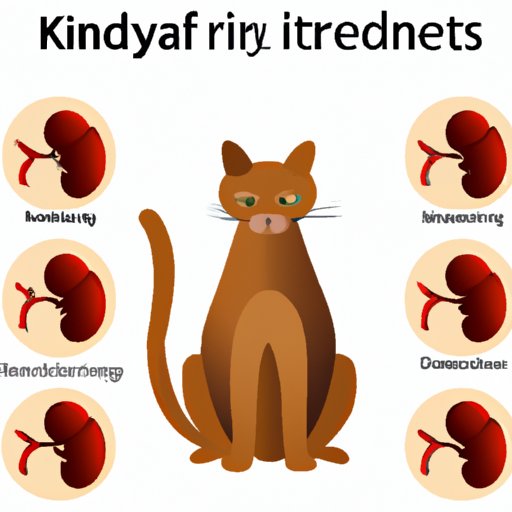
Introduction
Kidney disease in cats can be an incredibly devastating and painful condition for both your furry friend and their humans. Preventative measures can go a long way in avoiding kidney disease. This article will take a look at how to prevent kidney disease in cats through diet-oriented prevention measures, medical treatment options, and identifying risk factors.
General Overview of Kidney Disease in Cats
Kidney disease in cats is a serious and common condition that affects a large percentage of our feline friends. It is also known as Renal Failure, and it can have serious consequences on your cat’s health. Kidney disease in cats is usually caused by age, genetics, a poor diet, or by side effects of other medical diseases.
Symptoms of kidney disease are sometimes mistaken for ordinary changes in your cat’s behavior and may include a decrease in appetite, weight loss, excessive thirst, and difficulty urinating. To prevent kidney disease, you can take steps to increase your cat’s water intake by making sure fresh water is readily available and investing in a high-quality diet.
Diet-Focused Preventative Measures
A balanced and healthy diet is key to prevention of kidney disease in cats. A dried food diet alone is not enough to provide your cat with the necessary hydration. Consider offering your cat wet food, as it can provide extra hydration. Also, low-phosphorus options can help reduce the risk of kidney disease onset.
On the other side, it is also equally important to limit the foods that can be harmful for cats such as high protein diets and commercial treats. Raw fish may contain harmful bacteria that can lead to kidney issues in cats.
Medical Treatment Options
Some of the prescription diets and supplements that can help promote kidney function and prevent further damage include omega-3 fatty acid supplements and antibiotics. Consult your veterinarian before giving your cat any of these additions to their diet.
Risk Factors
It is important to identify the risk factors that can lead to kidney disease in cats. A few of the primary risk factors include breed, age, and existing medical conditions. It is recommended that older cats are monitored for signs of kidney disease and that regular checkups are scheduled every six months.
Cats who are high-risk and have existing medical conditions should be closely monitored by a veterinarian for the smallest changes in behavior, appetite, and overall health. Early diagnosis can stop the progression of kidney disease and help prevent further damage to your cat’s health.
Personal Experience
One such preventative measure is the focus on hydration levels. For instance, Mimi, a 14-year-old domestic shorthair cat, was diagnosed with kidney disease due to dehydration issues. After a critical care stay and follow-up appointments every few months, Mimi’s hydration levels balanced out, and she has since been with her human for two additional happy years.
The key takeaway from such experiences is that it is important to start preventive measures sooner rather than later as the signs of kidney disease may be subtle, but the outcome is costly physically and financially for both cats and humans alike.
Conclusion
In conclusion, kidney disease in cats can be devastating. You can prevent kidney disease by following best practices when it comes to your cat’s diet, medical treatment options, and identifying risk factors. Starting preventative measures sooner rather than later will be easier on your furry friend’s health and your wallet. Regular vet check-ups and diet-focused efforts can help prevent the onset of kidney disease and ensure that your pet remains healthy and happy for years to come.




